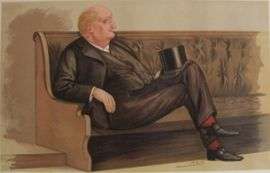John Macdonald, Lord Kingsburgh

Macdonald as caricatured by Spy (Leslie Ward) in Vanity Fair, June 1888

Sir John Hay Athole Macdonald, Lord Kingsburgh, KCB, PC, PRSSA, FRS, FRSE (27 December 1836 – 9 May 1919) was a Scottish Conservative Party[1] politician and later a judge.
Life
He was born on 28 December 1836 at 29 Great King Street in Edinburgh's New Town the son of Grace Hay and Matthew Norman MacDonald (later MacDonald-Hume) of Ninewells, an affluent Edinburgh lawyer. He was privately educated at Edinburgh Academy. He studied Law at Edinburgh University and the University of Basle in Switzerland.[2]
He was called to the Scottish bar in 1859. On 30 July 1875 he was appointed by Queen Victoria to be Sheriff of the Shires of Ross, Cromarty, and Sutherland.[3] He was appointed Solicitor General for Scotland from 1876 to 1880. He was appointed as Sheriff of Perthshire in 1880, and served as Dean of the Faculty of Advocates from 1882 to 1885.[4] Edinburgh University gave him an honorary doctorate (LLD) in 1884. In 1886 he was elected a Fellow of the Royal Society of Edinburgh. His proposers were John MacLaren, Lord MacLaren, Sir William Turner, Peter Guthrie Tait and Alexander Buchan.[5]
Elected as the Member of Parliament (MP) for Edinburgh and St Andrews Universities at the 1885 general election,[1] he served as Lord Advocate from 1885 to 1886 and from 1886 to 1888. He became a Queen's Counsel in 1880, and was appointed a Privy Counsellor in 1885. He was created a Knight Commander of the Order of the Bath (KCB) by Queen Victoria in 1900.
He was commissioned as a Lieutenant-Colonel in the 1st Queen's Edinburgh Rifle Volunteer Brigade in 1864, and was its Lt-Col Commandant from 1882 to 1892. He was one of the leading advocates of drill reform in the Volunteer movement, author of On the Best Detail Formation for the New Infantry Tactics (1873) and Commonsense on Parade or Drill without Strings (1886). In 1885 he organised a spectacular night assembly of the brigade, which resulted in 500 new recruits. He was later appointed as the brigade's Honorary Colonel, remaining in that role with the 5th (Queen's Edinburgh Rifles) Battalion, Royal Scots, when the Territorial Force was formed in 1908.[6][7][8][9][10]
He gave up his Parliamentary seat and was appointed Lord Justice Clerk in 1888,[1] taking the title Lord Kingsburgh, and presided over the Second Division of the Court of Session until 1915. He was promoted from Ensign to Lieutenant in the Royal Company of Archers on 18 June 1915.[11]
In 1916 King George V created him a Knight of the Grand Cross of the Order of the Bath (GCB).
He was an enthusiastic car owner and was a founding member of the Automobile Club and was the first president of the Scottish Automobile Club. He also registered Edinburgh's first ever number plate.[12] It is also believed that Macdonald coined the popular phrase "on your bike" as he turned away the incumbent Edinburgh mayor who claimed the number plate was rightfully his. As a riposte, he had the number plate S0 produced weeks later.
He died at home, 15 Abercromby Place, a short distance from his birthplace, on 9 May 1919. He is buried in St Cuthbert's Churchyard at the west end of Princes Street..[13]
Family
In 1864 he married Adelaide Jeanette Doran. She died not long after, in 1870.
Publications
- Practical Treatise on the Criminal Law of Scotland (1887)
References and notes
- 1 2 3 Craig, F. W. S. (1989) [1974]. British parliamentary election results 1885–1918 (2nd ed.). Chichester: Parliamentary Research Services. p. 571. ISBN 0-900178-27-2.
- ↑ Biographical Index of Former Fellows of the Royal Society of Edinburgh 1783–2002 (PDF). The Royal Society of Edinburgh. July 2006. ISBN 0 902 198 84 X.
- ↑ Edinburgh Gazette Issue 8603 published on 3 August 1875
- ↑ "Biographies of Candidates: Scotland". The Times. London. 30 June 1886. p. 8. Retrieved 8 June 2016 – via The Times Digital Archive.
- ↑ Biographical Index of Former Fellows of the Royal Society of Edinburgh 1783–2002 (PDF). The Royal Society of Edinburgh. July 2006. ISBN 0 902 198 84 X.
- ↑ Army List.
- ↑ Ian F.W. Beckett, Riflemen Form: A Study of the Rifle Volunteer Movement 1859–1908, Aldershot: Ogilby Trusts, 1982, ISBN 0 85936 271 X, p. 198; Appendix VI.
- ↑ Maj-Gen J.M. Grierson, Records of the Scottish Volunteer Force 1859–1908, Edinburgh:Blackwood, 1909, pp. 177–84.
- ↑ Ray Westlake, Tracing the Rifle Volunteers, Barnsley: Pen and Sword, 2010, ISBN 978-1-84884-211-3, pp. 78–81.
- ↑ Edinburgh Gazette Issue 27320 published on 4 June 1901. Page 7 of 68
- ↑ London Gazette 12821 published on 22 June 1915. Page 6 of 12
- ↑ http://news.bbc.co.uk/1/hi/scotland/edinburgh_and_east/7626467.stm
- ↑ Biographical Index of Former Fellows of the Royal Society of Edinburgh 1783–2002 (PDF). The Royal Society of Edinburgh. July 2006. ISBN 0 902 198 84 X.
External links
- Hansard 1803–2005: contributions in Parliament by John Macdonald
| Parliament of the United Kingdom | ||
|---|---|---|
| Preceded by Lyon Playfair |
Member of Parliament for Edinburgh and St Andrews Universities 1885–1888 |
Succeeded by Moir Darling |
| Legal offices | ||
| Preceded by James Moncreiff |
Solicitor General for Scotland 1876–1880 |
Succeeded by John Millar |
| Preceded by John Balfour |
Lord Advocate 1885–1886 |
Succeeded by John Balfour |
| Preceded by John Balfour |
Lord Advocate 1886–1888 |
Succeeded by James Robertson |
| Preceded by Lord Moncreiff |
Lord Justice Clerk 1888–1915 |
Succeeded by Lord Dickson |